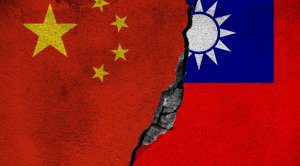 Beijing is upping the pressure because they realize Washington’s policy in support of Taipei will not change under President Joe Biden, writes J. Michael Cole in the National Interest.
Beijing is upping the pressure because they realize Washington’s policy in support of Taipei will not change under President Joe Biden, writes J. Michael Cole in the National Interest.
By J. Michael Cole, January 26, 2021
Less than a week after the inauguration of a new administration in Washington, China is already flexing its muscles in the Taiwan Strait with a sizable show of force over the weekend. This escalation suggests that even as Beijing seeks a “reset” with Washington, D.C., under the Joe Biden administration, its coercive strategy against the democratic island-nation of Taiwan that it claims as its own will continue apace.
On Saturday, thirteen Chinese People’s Liberation Army Air Force (PLAAF) and PLA Navy (PLAN) aircraft penetrated Taiwan’s Air Defense Identification Zone (ADIZ). The incident involved a Y-8 anti-submarine aircraft, eight Xian H-6K bombers and four Shenyang J-16 fighter jets. The next day, fifteen aircraft—two Y-8 anti-submarine aircraft, two Su-30, four J-16 and six J-10 fighter jets, as well as one Y-8 reconnaissance aircraft—flew into the southwest part of the ADIZ. Then on Monday, fifteen aircraft intruded into Taiwan’s ADIZ: two Chinese Y-8 anti-submarine aircraft, two Su-30, four J-16 and six J-10 fighter jets, as well as one Y-8 reconnaissance aircraft. According to Taiwan’s Ministry of National Defense, those were the highest number of Chinese aircraft to penetrate Taiwan’s ADIZ in 2021, and the highest since September 2020. Eighteen aircraft penetrated the ADIZ on September 18 (two H-6 bombers, eight J-16s, four J-11s and four J-10s) and nineteen—in “pincer formation”—on September 19 (twelve J-16, two J-10s, two J-11s, two H-6s and one Y-8). Later that month, PLA aircraft also intruded across the median line in the Taiwan Strait, and Chinese officials announced that the tacit agreement that had underpinned the median line no longer (or had never) applied.
Hostile PLAAF and PLAN activity in the Taiwan Strait had already become more frequent after Beijing’s nemesis, President Tsai Ing-wen, was re-elected with a record number of votes in January 2020, thwarting whatever hopes the Chinese regime may have had for Han Kuo-yu, its preferred candidate from the opposition Kuomintang (KMT). However, intrusions spiked in September 2020 amid visits to Taiwan by high-level American officials and a series of arms sales by Washington to Taipei. Analysts at the time attributed the military activity to retaliation by Beijing amid rapidly souring ties with the Trump administration. Since then, and as elections approached in the United States, the number of intrusions into Taiwan’s ADIZ had been reduced to the single-digit and mostly involved surveillance and anti-submarine aircraft.
We can probably attribute Beijing’s latest decision to escalate to its realization that U.S. commitments to Taiwan under a Biden administration will remain solid, dashing Chinese hopes that a Democrat government would overturn what China regarded as an aberration in U.S. behavior toward its Asian ally under President Trump. As President Biden’s appointments to key positions in the foreign and national security apparatus become known, it is becoming clear that the new administration’s policy toward China and Taiwan will not be walked back to what it was under President Obama—more permissive and built upon perceptions of China under the less assertive leadership of Hu Jintao. (Even then, as former president Obama writes in his autobiography A Promised Land, by the time Obama had begun his second term, Washington officials were becoming increasingly exasperated by Beijing’s behavior, particularly over trade and the South China Sea.) Xi Jinping’s emergence and consolidation of powers has upended longstanding U.S. assessments of China, deepening an increasingly bipartisan view that China was becoming more authoritarian and a destabilizing factor in international affairs. Thus, while President Trump brought a certain ideology to the White House, he did not engineer Washington’s more skeptical, if not hawkish, policy stance vis-à-vis China. Such a shift, observed in government circles, think tanks and within the general public, predated his election, and it was therefore inevitable that it would continue after his departure on January 20. (Meanwhile, Taiwan’s global reputation and visibility has never been better, which can be attributed to its handling of the coronavirus pandemic and health assistance to the international community, its exclusion from United Nations bodies such as the World Health Organization, and solid record on democracy, freedom of expression and human rights.)
The deeply held convictions of and statements by top officials at Biden’s National Security Council, such as Kurt Campbell, Laura Rosenberger and Shanthi Kalathil, by Secretary of State Anthony Blinken and Ely Ratner at the Pentagon, among others (not to mention Biden’s pick for USTR, Katherine Tai), are early indicators of continuity in U.S. policy in the Indo Pacific. And by default, this implies continued and reinvigorated engagement with Taiwan, an important ally of the United States in matters of security, health, trade, technology, and democracy. Furthermore, accusations in Republican circles and among Trump supporters that Biden would be “soft” on China will create additional pressures on the White House to prove such detractors wrong; for its part, Congress, where support for Taiwan is an a historical high, will create incentives for the executive branch to ensure continuity in U.S. engagement with and support for Taiwan.
Whatever belief Beijing may have held that Biden’s election would return the relationship to the status quo ante was predicated on a complete misreading of American attitudes toward its Asian challenger. Case in point, as PLA aircraft threatened Taiwan at the weekend, a U.S. aircraft carrier group led by the USS Theodore Roosevelt entered the South China Sea. And in a January 23 statement titled “PRC Military Pressure Against Taiwan Threatens Regional Peace and Stability,” the Department of State made it clear that:
“The United States notes with concern the pattern of ongoing PRC attempts to intimidate its neighbors, including Taiwan. We urge Beijing to cease its military, diplomatic, and economic pressure against Taiwan and instead engage in meaningful dialogue with Taiwan’s democratically elected representatives.
We will stand with friends and allies to advance our shared prosperity, security, and values in the Indo-Pacific region—and that includes deepening our ties with democratic Taiwan. The United States will continue to support a peaceful resolution of cross-strait issues, consistent with the wishes and best interests of the people on Taiwan. The United States maintains its longstanding commitments as outlined in the Three Communiqués, the Taiwan Relations Act, and the Six Assurances. We will continue to assist Taiwan in maintaining a sufficient self-defense capability. Our commitment to Taiwan is rock-solid and contributes to the maintenance of peace and stability across the Taiwan Strait and within the region.”
Beijing’s behavior at the weekend is therefore an early lashing out in realization that U.S. engagement with Taiwan will continue under a Biden administration. The PLA activity serves as a warning to Washington and an early attempt, through a demonstration of will and power, to deter it from further deepening U.S. ties with Taiwan. It also serves a domestic purpose, in that Beijing, after years of vilifying Trump with its domestic audience as an aberration, must now reassure the Chinese public that while things might not turn out as planned with Biden now in office, Beijing will continue to set the tone in the Taiwan Strait and the region. Having painted himself into a corner, Xi cannot show weakness. Given the early indicators of where the Biden administration is headed in terms of its China policy, Xi and his advisers (if he listens to them at all) may have concluded that whatever hopes they held of convincing the U.S. to treat it more as a partner than a competitor, or to cede it the sphere of influence it believes it deserves, were in vain. This reckoning is particularly alarming, in light of the new powers given Xi following amendments to China’s National Defense Law, which came into force on January 1. More than ever, Xi now has the ability to decide matters of war and peace and to mobilize the whole of Chinese society for the defense of China (as defined by the Chinese Communist Party), with the Central Military Commission, chaired by Xi, accruing new powers at the expense of the State Council.
Such changes, added to Chinese disillusionment over its unfounded expectations of a better (and more permissive) relationship with the U.S. under President Biden, combine to create a particularly dangerous phase in cross-Strait relations. Chinese assertiveness and destabilizing activities will prove an early test of U.S. commitments to Taiwan.
J. Michael Cole is a Taipei-based senior fellow with the Macdonald-Laurier Institute.





